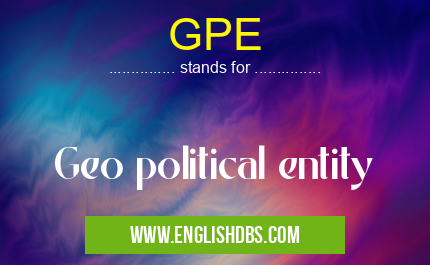What does GPE mean in POLITICS
Geopolitical Entity (GPE) is a term used in the world of government and international relations to describe a specific geographical area or grouping of countries that are considered to be a distinct unit. GPEs are often defined by their political, economic, and cultural characteristics, and they can range in size from small nation-states to large regions or continents. The concept of GPEs is important for understanding the dynamics of international relations, as it helps to explain how different parts of the world interact with each other and how conflicts and cooperation can arise.

GPE meaning in Politics in Governmental
GPE mostly used in an acronym Politics in Category Governmental that means Geo political entity
Shorthand: GPE,
Full Form: Geo political entity
For more information of "Geo political entity", see the section below.
» Governmental » Politics
Definition of GPE
A Geopolitical Entity (GPE) refers to a specific geographical area or grouping of countries that are considered to be a distinct unit. GPEs are defined by their political, economic, and cultural characteristics, and they can range in size from small nation-states to large regions or continents. The concept of GPEs is used in the world of government and international relations to understand the dynamics of international relations and how different parts of the world interact with each other.
Characteristics of GPEs
The characteristics of GPEs can vary depending on the specific entity in question. However, some common characteristics include:
- Distinct Geographical Boundaries: GPEs typically have clearly defined geographical boundaries that separate them from other entities.
- Political Unity: GPEs often have a single government or political authority that exercises control over the territory.
- Economic Interdependence: The countries or regions within a GPE are often economically interdependent, meaning that they rely on each other for trade and other economic activities.
- Cultural Identity: GPEs often share a common cultural identity, which can include language, religion, and historical traditions.
Examples of GPEs
There are many different examples of GPEs around the world. Some of the most well-known include:
- Nation-States: A nation-state is a GPE that consists of a single country with a central government. Examples of nation-states include the United States, China, and France.
- Regions: A region is a GPE that consists of a group of countries or territories that are located in a specific geographical area. Examples of regions include the European Union, the Middle East, and Southeast Asia.
- Continents: A continent is a large GPE that consists of a group of countries or territories that are located on a specific landmass. Examples of continents include Asia, Africa, and Europe.
Essential Questions and Answers on Geo political entity in "GOVERNMENTAL»POLITICS"
What is a Geopolitical Entity (GPE)?
A Geopolitical Entity (GPE) is a geographically defined political unit, such as a country, state, province, or municipality. It is an entity that has political boundaries and is recognized by other GPEs.
What are the different types of GPEs?
GPEs can be classified into several types, including countries, states, provinces, municipalities, and other political subdivisions. Countries are the highest level of GPE, followed by states, provinces, and municipalities. Other political subdivisions may include counties, districts, townships, and villages.
What is the significance of GPEs?
GPEs play a crucial role in international relations, diplomacy, and global governance. They represent the political interests of their citizens and engage in various forms of cooperation and competition with other GPEs. Understanding GPEs is essential for analyzing international affairs and global issues.
How are GPEs identified and classified?
GPEs are identified and classified based on a combination of factors, including their political boundaries, population, economy, and recognition by other GPEs. International organizations such as the United Nations and the World Bank maintain databases of GPEs and their classifications.
What is the relationship between GPEs and their citizens?
GPEs have a complex relationship with their citizens. They provide governance, public services, and protection to their citizens in exchange for loyalty, taxes, and other forms of support. The relationship between GPEs and their citizens can vary depending on the political system and cultural context.
Final Words: Geopolitical Entities (GPEs) are important units of analysis in the world of government and international relations. By understanding the characteristics and dynamics of GPEs, it is possible to gain a better understanding of how different parts of the world interact with each other and how conflicts and cooperation can arise. The concept of GPEs is a complex and evolving one, but it is an essential tool for understanding the complexities of the modern world.
